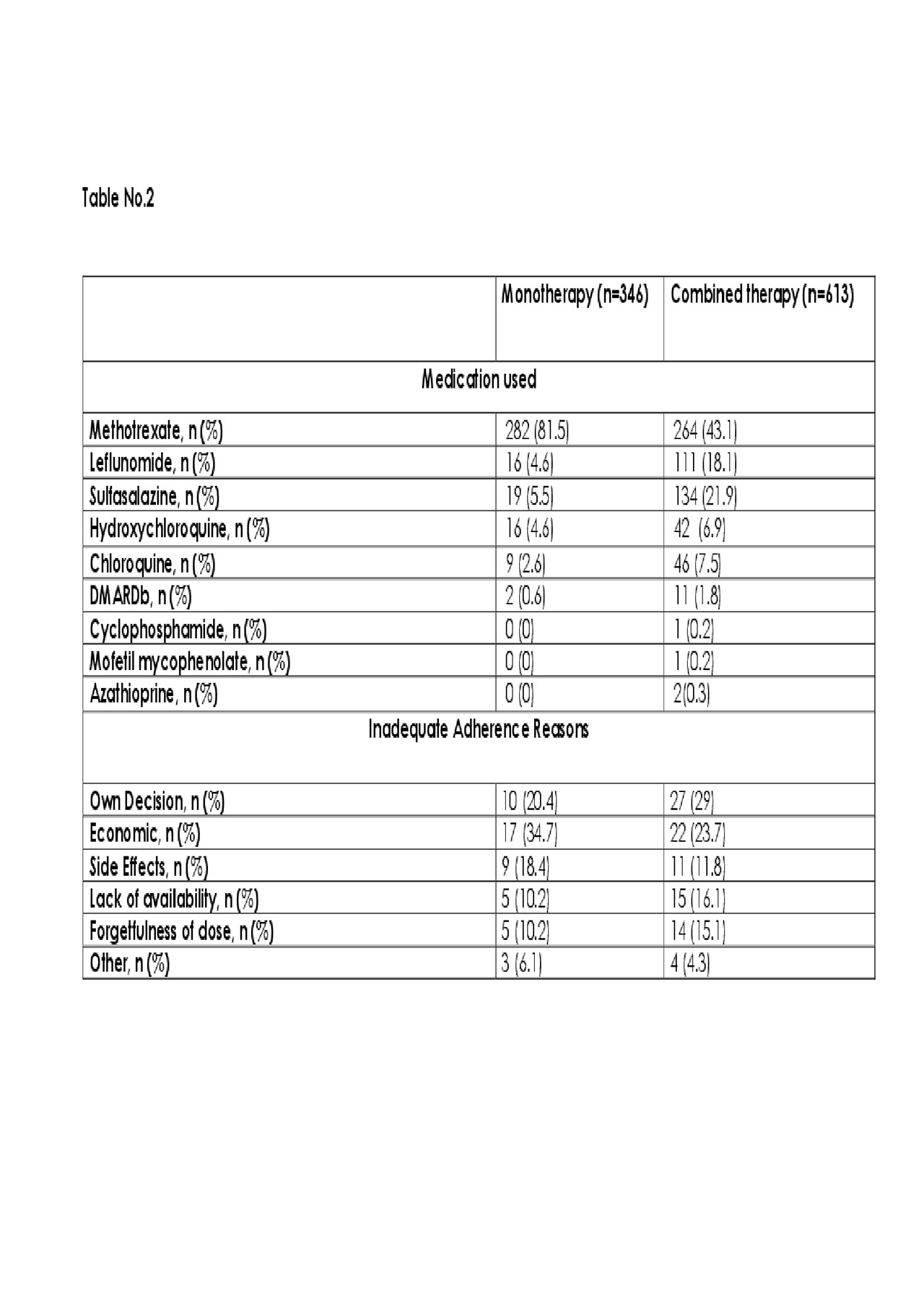Session Information
Session Type: Poster Session (Tuesday)
Session Time: 9:00AM-11:00AM
Background/Purpose: Treatment adherence in Rheumatoid Arthritis (RA) patients vary from 30 to 80%. It is important to identify the associated factors to a low adherence, so clinicians can make interventions to obtain better therapeutic results. Adherence to treatment has been described to be affected by several factors, such as access to healthcare facilities, education, socioeconomic status, quality of communication between physician and patient, among others. REPAIR® is a software designed with the purpose of improve data collection and medical practice in our outpatient clinic. The aim of this study was to compare the adherence to synthetic Disease-Modifying Antirheumatic Drugs (DMARDs) among RA patients with monotherapy and combined therapy (two medications) in an open population.
Methods: Cross sectional, observational, comparative study. This study was conducted in rheumatology outpatient clinic of University Hospital in Monterrey, México. Consecutive patients with RA were approached during their routine appointments, march 2018 to december 2018 period, were asked how many days of the last month they forgot or took their DMARDs (self-report). We classified the adherence rate in 2 categories based on the days of the last month they took the indicated medication; adequate: 75%-100% ( > 21 days), inadequate < 75% (< 21 days). When adherence was inadequate we ask about the cause. Data was obtained from REPAIR ® (internal electronic patient record). The Kolmogorov‐Smirnov test was used to determine normal distribution. Categorical variables are expressed as total number and percentage (%), and numerical variables as median and the 25th-75th percentiles (p25-p75). Chi square and Mann‐Whitney U‐test were used to compare groups and considered significant if p< 0.05. Data was analyzed with SPSS version 24.
Results: A total of 959 patients were included. When comparing adherence to treatment and gender between groups no statistically significant difference was found. The main cause of inadequate adherence in monotherapy group was economic (34.7%) and own decision in combined therapy group (29.1%).
Conclusion:
Patients with combined therapy had the same percentage of adherence as patients with monotherapy. These results may indicate that number of drugs prescribed not necessarily affects adherence to treatment in RA patients. The principal causes for an inadequate adherence to treatment were: economic for monotherapy group and own decision for combined therapy group. However, long-term studies are needed to evaluate the persistence of treatment in these groups of patients.
To cite this abstract in AMA style:
Hernández-Galarza I, Pineda-Sic R, Castro-Gonzalez M, Flores-Alvarado D, Ilizaliturri-Guerra O, Uriarte-Botello R, Galarza-Delgado D. Does Combined Therapy Affects Adherence in Rheumatoid Arthritis? [abstract]. Arthritis Rheumatol. 2019; 71 (suppl 10). https://acrabstracts.org/abstract/does-combined-therapy-affects-adherence-in-rheumatoid-arthritis/. Accessed .« Back to 2019 ACR/ARP Annual Meeting
ACR Meeting Abstracts - https://acrabstracts.org/abstract/does-combined-therapy-affects-adherence-in-rheumatoid-arthritis/


